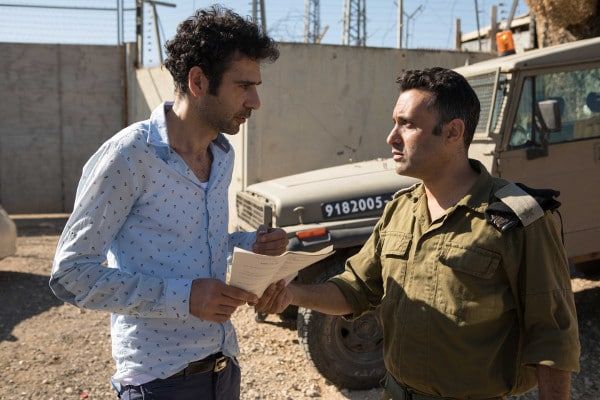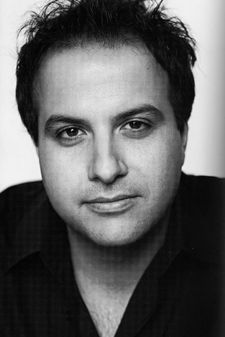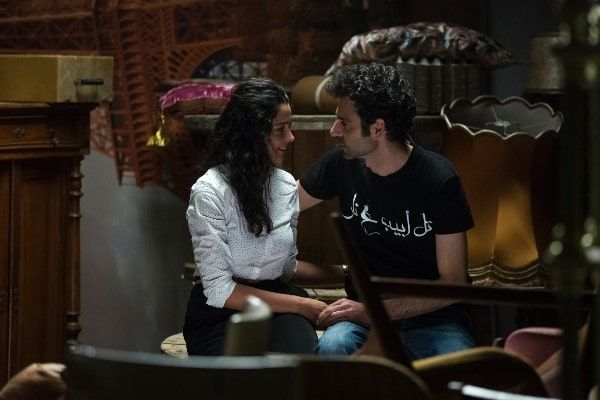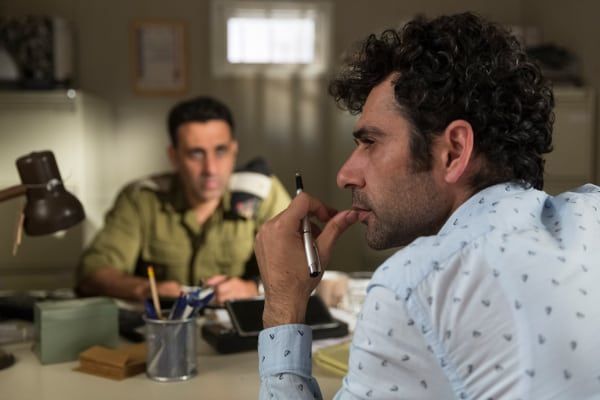Writer/director Sameh Zoabi is in an upbeat mood when I catch up with over Skype, fresh from the world premiere of his satire Tel Aviv On Fire in the Horizons section of the Venice Film Festival he's back home in Brooklyn, New York, and about to head to Toronto for its international premiere.
Expressing his delight that the 1500-strong audience in Venice had treated him to a standing ovation at the premiere, he admits: "I was worried that people might think it wasn’t serious enough and that the subject matter is too tense to be comedic about. I was fearing it would create a backlash because it’s not an arthouse film and it’s not a full-on mainstream."
It turns out, it wasn't just popular with audiences - the Horizons jury also named Kais Nashif Best Actor in the section.
Zoabi, who was born near Nazareth, says that comedy has been something he's settled to over time, working up to this after his first feature Man Without A Cell Phone (2010), but that it is born out of his own experience.
"I went to Colombia University in New York so always the question was: 'Oh, where are you from?', he says. "I said: 'Oh, I’m from Nazareth.'
"I have a lot of Jewish friends in Tel Aviv and I’ve been in Jerusalem a lot and people always think you are Jewish and coming from Israel. That was 2000-2001. And I realised that I always had to explain, 'You know, there are Palestinians who are Israeli citizens. We are 25 per cent of the population, blah, blah, blah…' I always felt like I was explaining this.
"So that was the subject of my first feature, to kind of try to make a film about where I grew up. About a kid who just finished high school and he needs to go out into the larger world, which involves Israelis. He went to an Israel university, because we live in small villages, we study in Arabic, there’s almost a sense of two segregated communities living next to each other. All the characters were inspired by me and my family and my friends.
"The film turned out to be a comedy. I was invited to Doha Film Institute. I didn’t really define the film, it was a drama of some sort, and then I realised I was invited to the panel called Comedy in Film and then the first question they asked me was, 'How does it feel to make a comedy about the Palestinian situation?' I said, 'I didn’t know I was making a comedy, until I was asked to come on the panel.'
"I grew up with a very humorous environment in Palestine, it was part of that notion of people just trapped in an awkward situation and they have to find humour to it. So, that was the beginning and I saw how it worked and how the audience responded. So, as a screenwriter, you start to evolve. I realised that Man Without A Cell Phone was not a fluke, it was not a one-time film where the film was funny, this is how I want to make films. It was more deliberate and I knew its comedic potential more but the approach was similar in a way – to stay true to the characters, to create situations. I started to find a recipe."
Although the film satirises the politics of the region, the situations are driven forward first and foremost by the characters own motivations - mainly Assi's desire to impress his wife and Salam's desire to win back an old flame.
"People are living in a reality and they’re almost unaware of it at a certain point," says Sameh. "That’s what I like. These individuals live in a state of political tension but it’s not the daily aspect of their life. They create their own things that they worry about – daily things, simple things. My main character, he wants to get his girlfriend back, he wants to get back on track and find his voice. It’s a simple quest in a sense and I like that kind of nuance. The politics is in the backseat for me. Politics is there but it’s not my focus in the film. It was the focus maybe of the soap opera because that’s what the soap opera was intended to be."
He adds: "You take a reality and then take another spin at it. This is just a natural ingredient that I grew up with, it’s not laboured for me because I grew up like this, my family is like this. They can’t tolerate tension."
He says there's a general global tiredness with politicians and a discontent with the way the world is heading.
"In Palestine and Israel, I feel it’s the same way," he adds. "People are jaded with the Palestinian Authority, they’re jaded with the Israeli right-wing becoming crazier. That common man who doesn’t want this and who is lost and trapped in this is not expressed any more – and it’s sad. That’s why I like my characters to be the people who are living in that reality and they’re trying to figure their way around. As opposed to someone who already knows they want to rule the world and oppress people. My hope is hinting that these common people exist and that eventually they could find their voice if they stepped away from their roles and became equals."
The script for Tel Aviv On Fire, which was shot in Luxembourg, Belgium and around Jerusalem, was co-written by Zoabi's university professor Dan Kleinman, who Zoabi describes as a"fantastic partner".
He adds: "He has nothing to do with the Middle East really, so he’s very distant from it in a sense, so that allowed us not to be too trapped with ideology and ideas."
Now he's returned to a project he was already working prior to Tel Aviv On Fire, Catch The Moon, which he's been working on with UK-based Sixteen Films, whose recent films have included You Were Never Really Here and I, Daniel Blake, for the past five years.
Zoabi says it was "facing the same problems" as Tel Aviv On Fire did initially, in that people didn't really know what category to put it in
"It’s a comedy set in Gaza," he adds. "It’s called Catch The Moon, so now we’re back to it. Sometimes, this is how the world of film works, people have to see to be convinced."
Tel Aviv On Fire will play Toronto Film Festival on September 13 and 16.

























